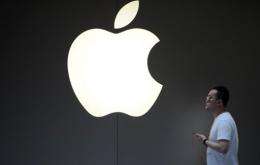Apple rejoins green tech program after spat

Apple said Friday it was rejoining a program to certify its products as environmentally friendly after a controversy that could have dented sales of its popular gadgets.
The California company behind iPads, iPhones, iPods and Macbooks said it was reversing its decision to quit the Electronic Product Environmental Assessment Tool (EPEAT) global registry.
Apple senior vice president Bob Mansfield said that the company listened to "customers who were disappointed" by the action to delist from the registry.
"I recognize that this was a mistake. Starting today, all eligible Apple products are back on EPEAT," he said in a letter posted on the company website.
"It's important to know that our commitment to protecting the environment has never changed, and today it is as strong as ever. Apple makes the most environmentally responsible products in our industry. In fact, our engineering teams have worked incredibly hard over the years to make our products even more environmentally friendly."
In dropping out last month from the registry, Apple offered no explanation but speculation centered around its use of batteries on some MacBooks which are glued into the frame and thus are not easily recycled.
Mansfield's letter said that some common yardsticks for green products could be "upgraded" and made stronger.
He said Apple "led the industry in removing harmful toxins such as brominated flame retardants (BFRs) and polyvinyl chloride (PVC)" and is "the only company to comprehensively report greenhouse gas emissions for every product we make."
The announcement came a day after San Francisco city officials said they would stop purchasing Apple products, citing a rule in place that requires laptops, computers or monitors bought by the city to meet top EPEAT standards.
City chief information officer Jon Walton said Thursday that San Francisco had "reached out to Apple" about the problem.
The procurement rule is similar to a standard used by other US cities and states as well as by the federal government, according to Walton.
EPEAT, which gives green ratings to computer desktops, laptops and monitors, was launched in the United States in 2006 with corporations and other large IT purchasers in mind.
EPEAT chief executive Robert Frisbee welcomed Apple's decision.
"We look forward to Apple's strong and creative thoughts on ongoing standards development," he said in a statement.
He said the group now has a "strengthened relationship with Apple" and is reviewing "how to reward innovations that are not yet envisioned with standards that are fixed at a point in time."
Greenpeace International analyst Casey Harrell welcomed the news.
"We applaud Apple for 'thinking green, not greedy' and listening to its customers' calls not to pit design needs against the environment," he said in a statement.
"We await more details that ensure that future versions of Apple's computers will be built with easily removable, recyclable and upgradable parts, unlike the current MacBook Pro. These design changes would make for a greener Apple product."
Apple has faced criticism from Greenpeace in the past for using what the environmental group called "dirty" power such as coal for its data centers for cloud services.
Amazon, Apple and Twitter were graded poorly in a Greenpeace study of technology titans' use of clean energy to power the mushrooming Internet cloud, but Facebook, Google and Yahoo! won praise.
(c) 2012 AFP


















